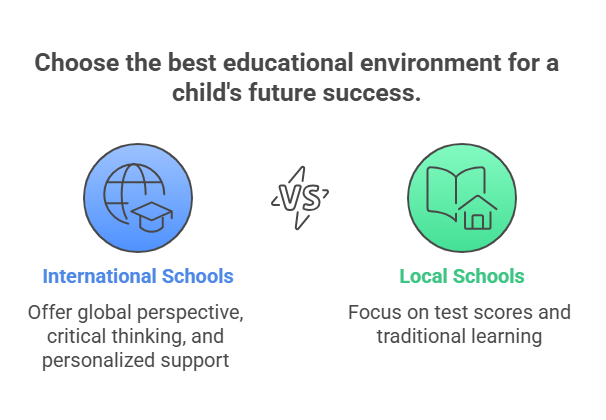Introduction
Why choose an international school? Because it offers a globally focused education, nurturing students into confident, culturally aware, and future-ready individuals. In our fast-changing globalised world, this is no longer a question of expatriate families with diplomats, bit has become essential for families aiming to prepare their children for success in today’s interconnected world. The modern world requires cross-cultural fluency, flexibility, and international experience in its students, but the traditional model of education can hardly provide such students with the necessary experience.
International schools are more than orthodox academics. They develop global competent people who are multilingual, in the sense that they are not just ready to get to the best universities of the world, but to life after school. Inquiry-based learning, internationally recognised curriculum, such as IB (International Baccalaureate) or Cambridge, and a heavy emphasis on the emotional and social dimension, these schools provide education fit for the future.
From childhood until high school, students of international schools are ready to become inquisitive, autonomous, and resilient. Students become globally-minded and well-rounded. When your family is moving to another country, looking into the future of your child getting into foreign universities, or you are simply trying to get a younger world perspective on your child, an international school may be the best decision you can make.
Join us as we explore why studying in an international school is not merely a fashion or rather a trend now, but rather a strategic academic and personal progress and achievement of the child in life.
Why Choose an International School?
Globally Recognized Curriculum
International schools follow prestigious programs like the IB (International Baccalaureate) or Cambridge, ensuring a world-class academic foundation that’s accepted by top universities worldwide.
Holistic, Inquiry-Based Learning
Emphasis on inquiry, exploration, and real-world problem-solving helps students develop critical thinking, creativity, and independence—not just rote memorization.
Culturally Diverse Classrooms
Learning in an environment with students from different nationalities and backgrounds fosters global awareness, respect, and cross-cultural understanding from a young age.
Smaller Class Sizes
With lower student-to-teacher ratios, learners get more individual attention, allowing educators to nurture each child’s strengths and learning style.
Focus on Emotional & Social Growth
Beyond academics, international schools support emotional intelligence, leadership, teamwork, and resilience, preparing students for life beyond the classroom.
Multilingual Exposure
Many international schools offer bilingual or multilingual education, helping children become fluent communicators and globally adaptable.
Academic Programs with a Global Perspective
International schools are designed to deliver high-quality education through globally recognised curricula such as the International Baccalaureate (IB), Cambridge Assessment International Education, or the Ontario Secondary School Diploma (OSSD).
These programs foster:
- Inquiry-based learning instead of rote memorisation
- Cross-disciplinary integration for deeper understanding
- Real-world applications of academic concepts
Students are encouraged to question, explore, and solve problems in creative and meaningful ways.
According to the OECD, students in globally oriented curricula develop stronger problem-solving and collaboration skills compared to their peers in traditional systems.
IB & International Curriculums That Shape Future Leaders
The IB programme is known for its academic rigor and balanced development. Students learn not only content but also how to learn-becoming thinkers, communicators, and principled leaders.
IB students:
- Conduct original research (Extended Essay)
- Explore global issues (Theory of Knowledge)
- Participate in Creativity, Activity, Service (CAS) projects.
- Gain multilingual and intercultural competencies.
According to ibo.org, more than 5,000 schools in over 150 countries now offer IB programs, and their graduates are highly sought after by leading global universities.
University Prep Backed by Worldwide Recognition
International schools offer extensive university counselling, mentorship, and dual diploma options. Graduates are accepted into Ivy League schools, Oxbridge, top Canadian universities, and more.
According to the Ontario Ministry of Education (2023), OSSD graduates have access to over 95% of Canadian universities and many top institutions in the U.S., U.K., and Australia.
Personalised support includes:
- College essay and statement review
- SAT, ACT, IELTS, and TOEFL prep
- University application strategy for multiple countries
Explore top schools in Canada for international students
Why Choose an International School Over a Local School: A Transformative Learning Experience

The education at the international schools is more extensive, with a global outlook as opposed to the majority of the local schools. They focus more on critical thinking, culture learning and real-life education rather than memorisation. Students get a more personal support because the classes are less crowded and teaching is more personalised. The ethos cultivates not only academic achievement but also emotional intelligence and world readiness. Families around the world are increasingly realizing the long-term benefits of why choose an international school for a future-ready, globally relevant education.
Building Future Skills: More Than Just Academics
While local schools may prioritise test scores, international schools build competencies that prepare students for tomorrow’s workforce:
- Leadership and team collaboration
- Global citizenship and social impact
- Tech-savvy problem-solving
- Resilience and adaptability
These future-ready skills are embedded through experiential learning, service projects, and interdisciplinary modules.
Personalised Growth: Tailored Learning for Every Child
One of the strongest reasons why parents choose international schools is the individualised attention students receive. With smaller class sizes, schools can offer:
- Tailored learning plans
- Enrichment opportunities for gifted students
- Support for students with learning differences
Teachers are trained to track progress and modify instruction based on student needs-something many overcrowded local systems struggle to deliver.
Age-Specific Benefits: Why Choose an International School for Every Stage
Each Stage Benefits: Why Expat Parents May Decide to Study in an International School at All Levels. The international schools offer age-based learning experiences that are beneficial at all stages of a child. When young, they are interested in play-based explorations. The basic skills that the children in primary schools are taught are related to exposure to culture. High schoolers receive intensive academics and international opportunities that prepare them to enter university and their life. But successive stages develop confidence, adaptability and a lifetime appreciation of learning.
Preschool: Multilingual storytelling sessions develop language skills
High School: Model UN participation builds diplomatic skills through simulated UN climate negotiations
Why Choose an International School for Early Childhood Education (Preschool & Primary)
One of the most compelling reasons why choose an international school for your child is the opportunity to develop cross-cultural understanding and academic excellence from an early agDuring the foundational years, international schools focus on play-based, inquiry-driven learning. For preschool and primary students, this approach encourages:
- Early language development through multilingual exposure
- Confidence through exploration and discovery
- Strong motor, social, and emotional skills
Curriculum like the IB Primary Years Programme (PYP) or Montessori-based international models emphasise a nurturing yet intellectually stimulating environment.
Example: In an IB PYP setting, a 6-year-old may explore the concept of “community” by interviewing school staff, drawing maps, and building mini-cities-applying math, language, and creativity simultaneously.
Why Choose an International School for High School Education (For High School Students)
High school in an international school is about preparing for life, not just exams.
Key features include:
- Access to advanced coursework (IB, A-Levels, AP, or OSSD)
- Emphasis on original research, presentations, and debates
- Internship or volunteer experience through CAS or service learning
- College guidance from Grade 9 onward
A student preparing for medicine may take HL Biology and Chemistry, volunteer at a local clinic through CAS, and write an Extended Essay on genetic research skills directly transferable to university.When comparing academic environments, it becomes clear why choose an international school over a local school and the global curriculum, diverse student body, and advanced learning methods stand out.
Learn more about the OSSD curriculum
World-Class Pathways: Advanced Curricula for University Success
International schools provide internationally recognised curricula such as the International Baccalaureate, A-Levels and OSSD that are meant to ensure that the students qualify for the best universities in the world. These progressive curricular emphasise research, thought and practice. Upgrading students to learn perimeter and transferable skills with more knowledge depth, this will meet the requirements set by universities. International recognition with good college counselling makes the way smooth to higher education.Educators and parents alike recognize why choose an international school for early childhood education as it builds curiosity, communication skills, and foundational thinking through play-based learning.
IB and Global Curricula: A Deeper Learning Experience
Programs like IB DP, A-Levels, and OSSD are built for university preparation.
Students develop:
- Advanced writing and research skills
- Academic integrity and citation practices
- Complex reasoning through projects and oral presentations
These skills translate directly into undergraduate expectations, making the university transition smoother and more successful.
Unparalleled University Preparation and Global Pathways
Top international schools have dedicated college counsellors, career days, university fairs, and alumni mentoring.
IBO’s 2023 study shows Diploma Programme graduates are 3x more likely to attend top-100 universities (QS-ranked).
Additional benefits include:
- Global application support
- Scholarship tracking and recommendations
- Test prep resources
Check how to get a scholarship to study in Canada
The Lifelong Impact: Beyond Graduation
The utilities of an international school are really beyond the classroom. Graduates enter the world equipped with an international outlook, excellent communication and cultural sensitivity. They create a network and friendship that will last their life and cross countries and industries. Equipped with adaptability, they excel, they are ready to excel in a variety of university settings and global-bound employment. Unlock your full potential with our UPSC academy, where expert faculty, personalised mentoring, and structured study plans guide you every step of the way.
Building a Global Network: Connections That Last a Lifetime
International schools attract families from diverse cultural, professional, and linguistic backgrounds.
Graduates Build:
- A global peer network
- Access to global alumni platforms
- Cultural fluency to thrive anywhere
Many alumni describe their school friendships as lifelong, stretching across countries and continents.
Fostering Adaptability and Resilience in a Changing World
benefits of international schools in today’s world? Because adaptability is no longer optional-it’s essential.
Through cross-cultural experiences, transitions, and new perspectives, students develop:
- Emotional agility
- Global awareness
- Confidence to face change
These traits are crucial in a future shaped by AI, climate change, migration, and global collaboration.
Is an International School the Right Fit for Your Family?
The selected school should rely on family values, lifestyle and long-term goals. They are perfect institutions to be used by international families that are highly mobile or those who are in need of a futuristic and global education. They provide uniformity between nations, varied cultural setups and good academic routes. An international school might be ideal in case you appreciate an international readiness and customised learning.
Key Factors to Help You Decide
Here are some practical considerations for parents:
| Factor | What to Consider |
| Curriculum Fit | Does the school offer IB, Cambridge, or OSSD aligned with your child’s goals? |
| Mobility | Will you relocate in future? International schools ensure consistency. |
| Cultural Exposure | Do you want your child to grow up with a global mindset? |
| University Goals | Does the school have a good track record in higher education admissions? |
International schools are ideal for expat families, globally mobile professionals, and forward-thinking local families seeking a modern, holistic education.
Testimonial – At just five years old, Zara started the IB Primary Years Programme (PYP) at an international school in Dubai. She continued the same curriculum after her family moved to Canada, ensuring educational consistency. Her learning was focused on storytelling, community mapping, and inquiry-based play. Zara quickly became bilingual in English and French, showed empathy through a class pet-care project, and learned foundational research skills.
“The PYP encouraged Zara to ask questions, explore ideas, and become a confident communicator. She’s now in Grade 4 and already dreams of becoming an environmental scientist!” — Her mother, Anjali Mehta
Conclusion: The Smart Choice for Global Readiness
So, benefits of international schools?
Because it equips your child with:
- Academic excellence recognised worldwide
- Skills that go beyond the classroom
- A global network and worldview
- Personalised support for every learning journey
Whether your child is just starting school or preparing for university, an international school offers the best platform to learn, grow, and lead in a complex world.
Frequently Asked Questions About Why Choose an International School
1. How do you think an international education will benefit your child?
It creates a global attitude, academic strength, and flexibility abilities needed in the future. Students have an opportunity to absorb different cultures, languages, and perspectives, as international education is likely to promote open-mindedness and the desire to empathize. It also enhances critical thinking, group work, and leadership; which are prerequisites in the modern and globalised world. These competences equip the children not only in high learning institutions but also in the world of career and good citizenry.
2. What is the goal of international education?
International education aims to develop tolerant, educated and euphoric people who will make this world a better place to live in. It is focusing on preparing learning students who are aware of cultural differences and can appreciate them and meaningfully interact with international affairs, and behave more responsibly and morally. Curriculums such as IB support lifelong learning, intercultural awareness, and achievement in academics, which establishes the basis of how the students can flourish in international communities and make contributions towards global development.
3. What is the international school’s teaching method?
It focuses on inquiry-based interdisciplinary and student-centred learning that is based on understanding and relevance in the real world. Students are also made to seek answers, raise more questions and have different opinions and use knowledge in various disciplines. This strategy leads to better participation and individual thinking. Most international schools follow the IB or Cambridge system of education, which incorporates project work, presentation and community service to form a holistic learning process that would take the learners to the university and beyond.
4. Which language is best for international students?
Most commonly used is English, although such international schools usually provide more multilingual learning (French, Mandarin, Spanish), which further increases international possibilities. In the majority of academic programs, English is a must all over the world, particularly in Canada, the U.K., and the U.S. But being multilingual places the students at a definite advantage with regards to diplomacy, international business and multicultural environments, allowing them to communicate more effectively, think in a cognitively diverse manner and have more choices available with respect to universities and vocations to pursue.









